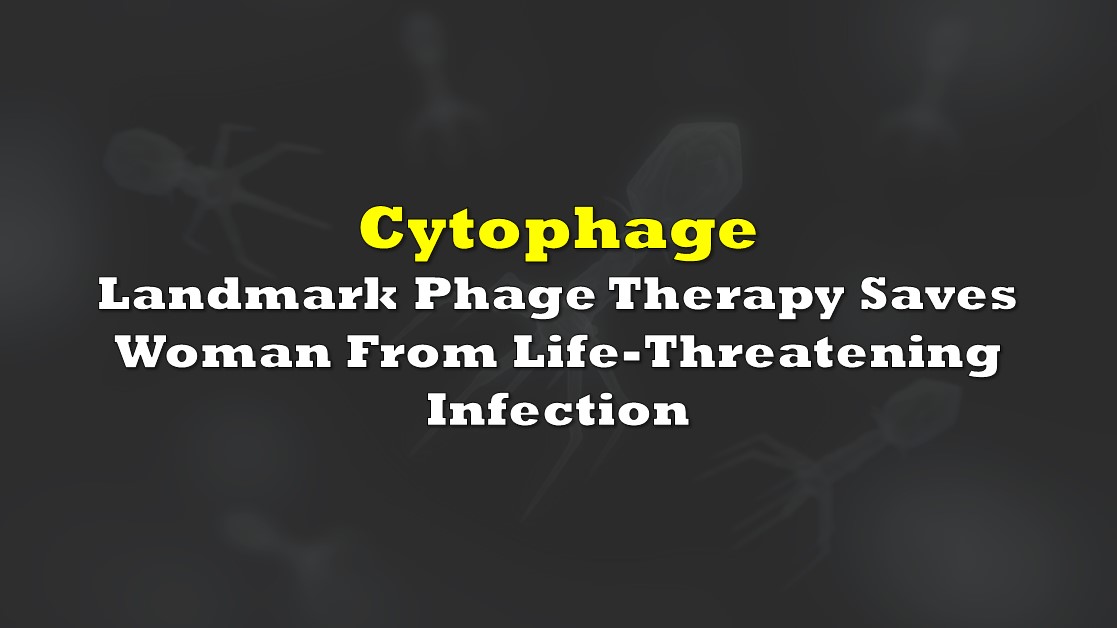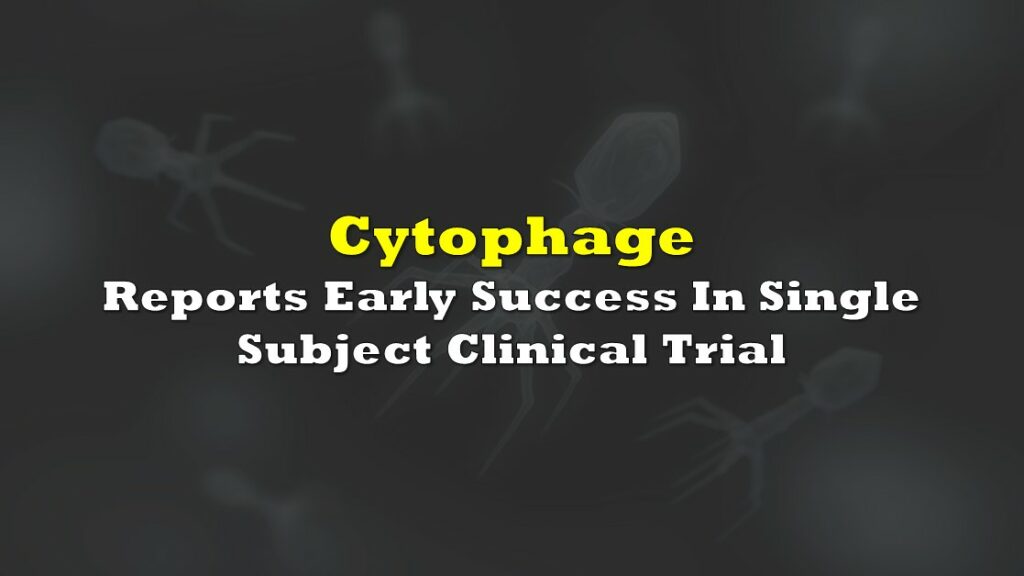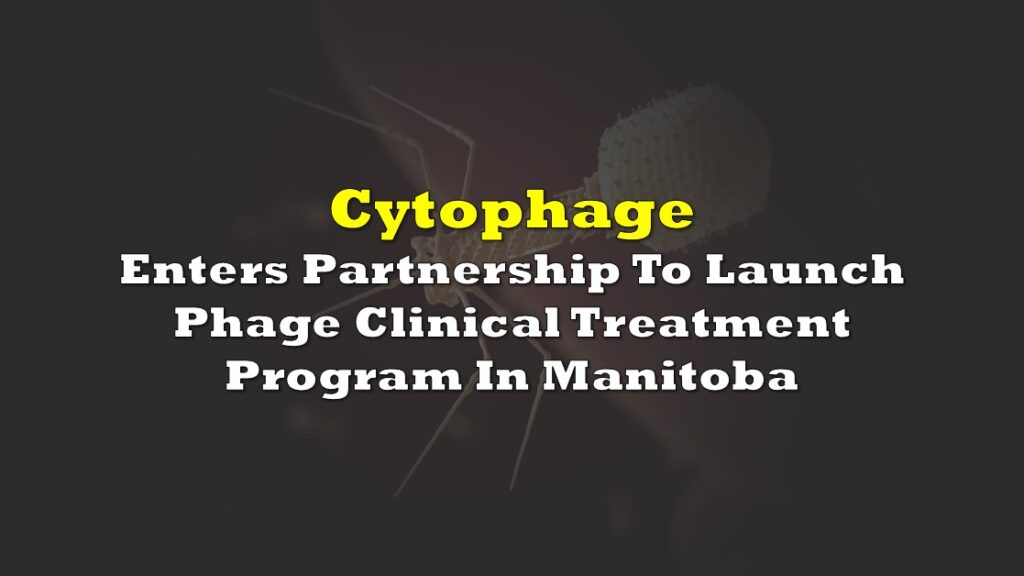FULL DISCLOSURE: This is sponsored content for Cytophage Technologies.
A 79-year-old resident from the Ottawa area credits an experimental treatment developed in Winnipeg with saving her life from a chronic artificial joint infection. Believed to be the first person in Canada to undergo phage therapy for periprosthetic joint infection, Thea Turcotte’s journey highlights the transformative potential of this pioneering approach.
Facing a debilitating infection resistant to conventional antibiotics, she faced a grim prognosis, with doctors considering leg amputation due to the severity of her condition.
For Turcotte, the journey began with a slip on ice, resulting in numerous surgeries and complications. It developed into a life-threatening infection that persisted despite undergoing 15 surgeries over eight years. With the infection spreading and conventional treatments failing, her infectious disease physician, Dr. Marisa Azad, turned to phage therapy as a last resort.
“There was a pocket of massive infection that had opened up over the hip. She relapsed. She had early signs of sepsis. She had low grade fever, chills with increasing hip pain. So this is a very serious situation. I was extremely concerned,” Azad said. “I was extremely limited in what we could do to treat her. And really, this was the end of the line…. That’s where I turned to phage therapy.”
Azad and her team secured rare approval from Health Canada for a single-patient trial, highlighting the urgency and significance of Turcotte’s case.
“Without this trial, I probably would not be here by now. It’s given me a new lease on life,” said Turcotte.
Cytophage Technologies
Samples of the infecting Staphylococcus epidermidis bacteria were sent to Cytophage Technologies Ltd (TSXV: CYTO), a biotech start-up based in Winnipeg and listed on the TSX Venture, where CEO Dr. Steven Theriault and his team tailored a phage specifically for Turcotte. Administered through injections and IV infusions, the therapy showed promising early signs of efficacy.
“What we do is ensure that our bacteriophage is killing the patient’s bacteria at a very high level, so 100 per cent or 98 per cent, making sure that we get rid of that bacterial infection … creating a solution for patients that don’t have any solutions because of antimicrobial resistance and antibiotic resistance,” Theriault said.
Worth watching! – CTV covered the human phage trial where Cytophage bacteriophages were used to treat a patient with an antibiotic-resistant prosthetic joint infection.$CYTO #phage #phagetherapy #bacteriophageshttps://t.co/wxYJ0Oo9n1 pic.twitter.com/0GsgpaWKhb
— Cytophage Technologies Ltd. (@cytophagetech) March 27, 2024
Phage therapy, which utilizes viruses targeting bacteria without affecting human or animal cells, emerged as a beacon of hope for Turcotte. Administered through injections and an IV line, the treatment yielded promising results, with a notable reduction in inflammation and cessation of leakage from the infected joint.
While still in the experimental stage in Canada, the success of the program has received coverage across the country, a rarity for a Venture-stage company. CTV News covered the success at both the national level, as well as locally in Winnipeg, where Cytophage is based. CBC News meanwhile also included it in their local coverage, and even went so far as to feature it on The National.
The programs success meanwhile prompts optimism for broader applications.
“This was my last resort. I had no other choice. So it was very scary. Also exciting. But I had to do it. It was do or die,” she added. “By me doing this, [I hope] that eventually it will be given to other patients who need it as badly as what I did, and hopefully making them feel much better and living a longer life.”
Azad and Theriault are committed to advancing research and submitting findings to Health Canada for further trials.
Turcotte’s experience underscores the critical need for innovative treatments in the face of antibiotic resistance. As Theriault noted, phage therapy represents a significant advancement in patient care, providing solutions where traditional therapies fall short.
“It’s a step forward for bacteriophages. It’s also a step forward for treating patients with debilitating diseases that can’t be treated normally. And honestly, once we get the government to understand how phages are so beneficial, we’re going to have a new therapy for patients which is going to be amazing,” Theriault emphasized.
What is a bacteriophage?
Bacteriophages are specialized viruses that infect and kill bacterial cells. Unlike antibiotics, which indiscriminately target both harmful and beneficial bacteria, phages specifically attach to targeted bacteria, inject genetic information, replicate within the host bacterium, and ultimately rupture the cell wall, leading to the demise of the bacterium. This precise mechanism of action ensures that human cells remain unharmed during treatment.
Historically, humans have relied heavily on antibiotics to combat bacterial infections. However, overuse and misuse of antibiotics have led to the rise of superbugs—bacteria resistant to antibiotic treatment. Phages have the advantage in this context as their highly specialized nature enables them to effectively kill bacteria without contributing to antibiotic resistance.

Born from the discovery of French Canadian scientist Félix d’Hérelle in 1917, phages experienced a resurgence thanks to their potential in combating antibiotic-resistant infections.
Phage therapy, the use of bacteriophages to treat bacterial infections, has shown promising results in clinical trials, even in cases where antibiotics have failed. In this field, Cytophage offers tailor-made synthetic bacteriophages designed to attack multiple species of bacteria.
“We’re a team of scientists that are synthetic biologists as well as trained virologists or people that work on viruses. And what we do is we unlock the potential of bacteria phages,” said Theriault.
Theriault emphasized the intricate mechanism behind phage therapy likening it to a lunar lander. The virus attaches to bacterial cells, injects its genetic material, and subsequently replicates within the cell, ultimately leading to its destruction—a continuous cycle of bacterial eradication.
Earlier this year, the Science, Innovation & Technology Committee of the UK Parliament highlighted the potential of phages in addressing antimicrobial resistance, which resulted from the widespread use of antibiotics. Phages have yet to be licensed for therapeutic use in the UK, only being deployed as compassionate treatments in isolated cases of otherwise untreatable infections.
The development of phage therapies faces a significant hurdle: clinical trials necessitate phages manufactured to Good Manufacturing Practices (GMP) standards, yet investment in compliant manufacturing facilities hinges on the demonstration of efficacy in these trials.
“The development of phage therapies is at an impasse, in which clinical trials need new advanced manufacturing plants, but investment requires clinical trails to have demonstrated efficacy,” said Rt Hon Greg Clark MP, chair of the committee.
READ: Cytophage Sees Its Bacteriophages Used As Treatment In Canada Under Single Subject Clinical Trial
The committee proposes repurposing the mothballed Rosalind Franklin Laboratory in the West Midlands as a GMP facility, urging collaboration between government agencies, researchers, and regulatory bodies to facilitate the advancement of phage research. Additionally, the committee recommends raising awareness among healthcare professionals about the antimicrobial potential of phages, advocating for a clear governmental stance on phages’ role in addressing AMR.
On the other hand, Cytophage has also developed OvaPhage, a product designed to combat bacteria like Salmonella on egg surfaces, which proved to be timely amidst a potential salmonella contamination leading to the federal government conducting a recent egg recall. Laboratory studies show OvaPhage reduces bacterial load by 90%, potentially enhancing food safety standards.
As proof of the strides they’ve made in the filed, Cytophage received the Defense Innovation Award in 2019 and won the 2018 Nutreco Feed Tech Challenge for their innovations.
Looking ahead, Cytophage aims for a dynamic year of innovation, with plans to introduce multiple product releases in 2024 utilizing their cutting-edge bacteriophage technology.
FULL DISCLOSURE: Cytophage Technologies is a client of Canacom Group, the parent company of The Deep Dive. Canacom Group is currently long the equity of Cytophage Technologies. The author has been compensated to cover Cytophage Technologies on The Deep Dive, with The Deep Dive having full editorial control. Not a recommendation to buy or sell. Always do additional research and consult a professional before purchasing a security.









